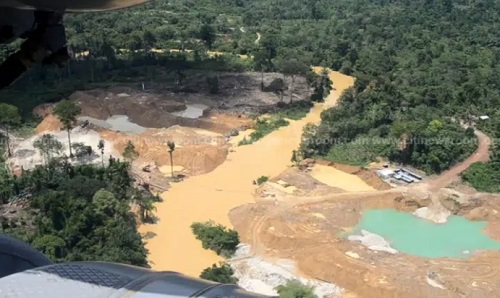Illegal mining—popularly known as galamsey continues to ravage Ghana’s environment, endangering our forests, water bodies, farmlands, and public health.
While successive governments have tried various approaches to curb this menace, progress remains marginal.
Galamsey affects our health in several ways. For example, our water bodies are full of deadly chemicals that can harm people in rural communities. The farmlands destroyed could lead to a reduction in food production that can result in malnutrition, with all the health implications. Some medicinal products in the forest are under threat from galamseyers. Galamsey has created pits that pose health risks to the health of farmers who may not be aware of them. Our law enforcement agents are being shot to death by galamseyers with sophisticated weapons.
The number of people involved, the rich merchants behind it, and the machines deployed in the industry are making the fight against galamsey difficult. Some stakeholders estimate that about 1,000,000 individuals are involved in the industry, for example.
The current administration’s effort to repatriate foreigners involved in illegal mining is one strategy to fight the menace. However, this policy raises critical questions: What do we gain by simply sending culprits back to their home countries while they leave behind environmental devastation that costs Ghana millions to repair? Why do we suffer losses when foreigners go to their countries to enjoy the money gained from destroying our environment?
According to Dr Kenneth Ashigbey, convener of the Media Coalition Against Illegal Mining, reclaiming just 3,000 hectares of land destroyed by illegal mining could cost Ghana around $120 million, as reported by Graphic Online yesterday.
We propose that minor offenders in Ghana’s prisons be released to make space for galamsey convicts who should pay for their crimes. Why should a Ghanaian who has stolen a goat, for example, be made to suffer in prison for years while galamseyers go scot free? All culprits should be fined to create funding for reclaiming our lands. Fines from these offenders must be earmarked solely for reclaiming degraded lands, forests, and water bodies. Moreover, guilty individuals should contribute labour and expertise—especially those who operated heavy machinery must be made to operate machines to reclaim our lands, and others should provide the support labour needed to reclaim our lands.
Foreigners must be fined heavily and be made to work to reclaim our lands, forests, and water bodies before being deported. All foreigners found guilty should be blacklisted for at least 10 years using biometric data and monitored at all ports of entry. If caught again, they should be sentenced to mandatory hard labour to reclaim the land they helped destroy. We must agree on these with our diplomatic stakeholders.
To dismantle the financial backbone of illegal mining, investigators must identify and prosecute the financiers behind the scenes. Their prosecution and contributions are essential to halting the flow of funds into the industry. Money is fuel for galamsey. Unless we stop money from going into galamsey, we will not achieve much.
Additionally, the Ministry of Interior should publish a monthly list of foreign nationals involved in galamsey to expose and pressure nations whose citizens top the list diplomatically, so that foreign missions will get involved to help us fight galamsey.
Galamsey is not just an environmental issue—it’s a national crisis. We must shift from short-term fixes to long-term strategies that recover losses and restore dignity to our land.
The author is Emmanuel Opuni - Executive Director, Centre for Health Policy and Development–Africa, executivedirector@healthpolicyafrica.org

